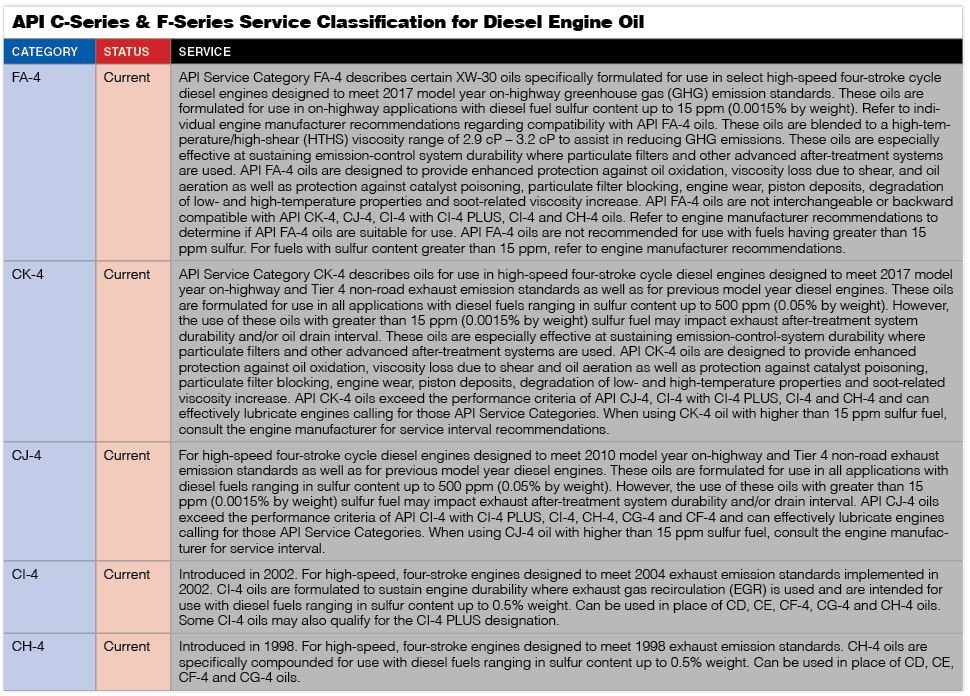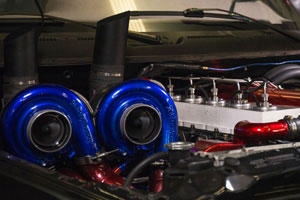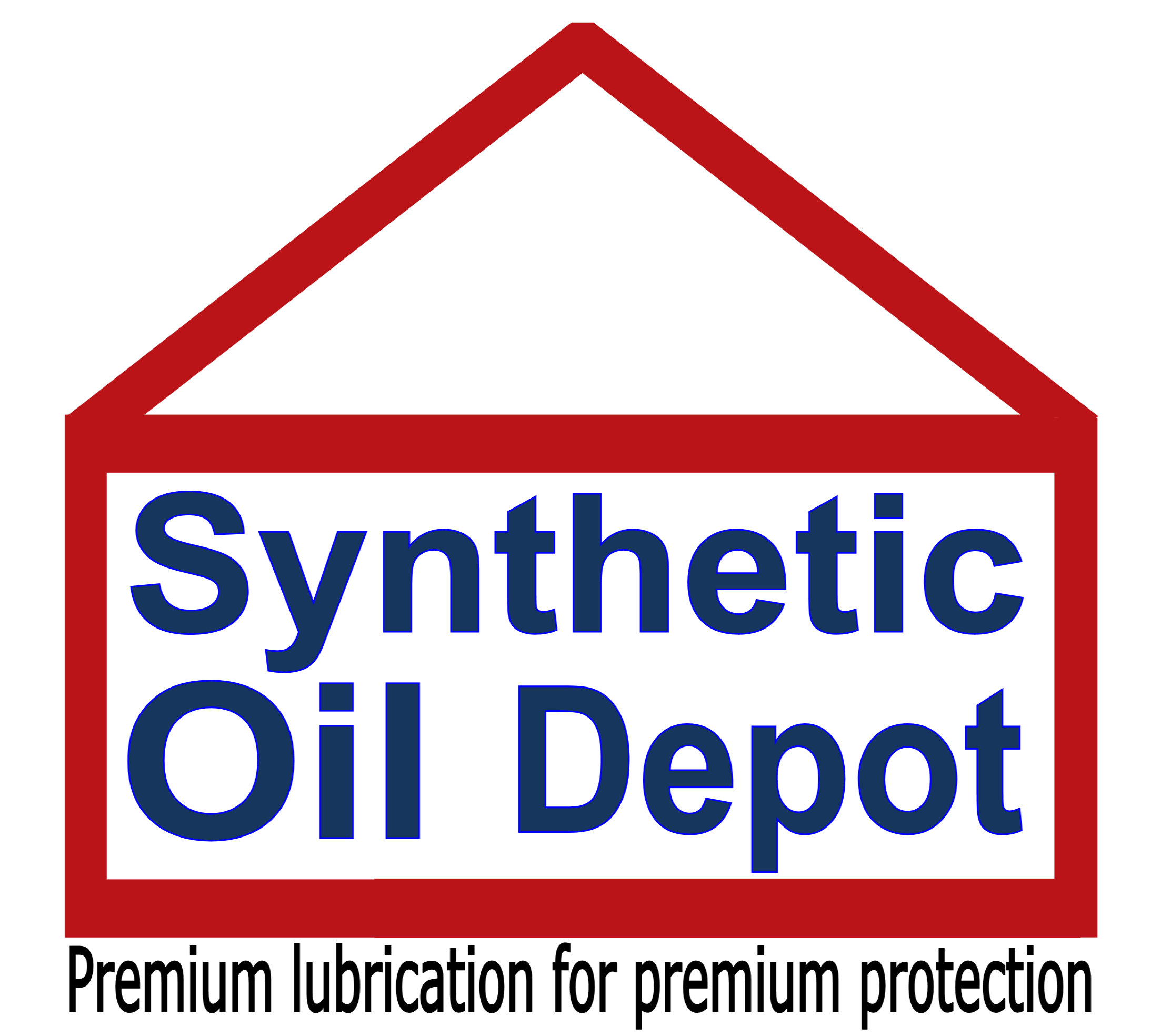
A Beginner’s Guide to Motor Oil, What You Need to Know part 5. Diesel Motor oils, how are they classified and how to choose the best diesel oil.
How is diesel engine oil classified?
The API C-series classifications pertain to diesel engines. The “C” stands for compression ignition systems, which is how diesel engines operate. The C- Series contains API CK-4 (most Recent), CJ-4, CI-4 PLUS, CI-4, and CH-4 oils. Driven by federal regulations that raise the bar for fuel economy while lowering emission limits, modern diesel vehicles produce more horsepower and torque than ever. They run much hotter, operate under higher pressures and have the ability to burn up to 20 percent biodiesel. These advances place new demands on diesel oil, in addition to the demands for increased protection from those who depend on diesel power to make a living. New classifications are introduced when new technology or standards require reformulation of oils to protect modern diesel engine.
What about the FA-4 Class?
The new FA-4 classification pertains only to some 2017 and newer diesel engines mostly in over-the-road trucks. API FA-4 oils are not interchangeable or compatible with API CK-4, CJ-4, CI-4 PLUS, CI-4, and CH-4 oils. Consult your Owners manual for the correct oil.
Here are the American Petroleum Institutes Technical Specs for current API C – Classifications for Diesel Motor Oil.
CK-4 – API Service Category CK-4 describes oils for use in high-speed four-stroke cycle diesel engines designed to meet 2017 model year on-highway and Tier 4 non-road exhaust emission standards as well as for previous model year diesel engines. These oils are formulated for use in all applications with diesel fuels ranging in sulfur content up to 500 ppm (0.05% by weight). However, the use of these oils with greater than 15 ppm (0.0015% by weight) sulfur fuel may impact exhaust after treatment system durability and/or oil drain interval. These oils are especially effective at sustaining emission control system durability where particulate filters and other advanced after treatment systems are used. API CK-4 oils are designed to provide enhanced protection against oil oxidation, viscosity loss due to shear, and oil aeration as well as protection against catalyst poisoning, particulate filter blocking, engine wear, piston deposits, degradation of low- and high-temperature properties, and soot-related viscosity increase. API CK-4 oils exceed the performance criteria of API CJ-4, CI-4 with CI-4 PLUS, CI-4, and CH-4 and can effectively lubricate engines calling for those API Service Categories. When using CK-4 oil with higher than 15 ppm sulfur fuel, consult the engine manufacturer for service interval recommendations.
CJ-4 – For high-speed four-stroke cycle diesel engines designed to meet 2010 model year on-highway and Tier 4 non-road exhaust emission standards as well as for previous model year diesel engines. These oils are formulated for use in all applications with diesel fuels ranging in sulfur content up to 500 ppm (0.05% by weight). However, the use of these oils with greater than 15 ppm (0.0015% by weight) sulfur fuel may impact exhaust after treatment system durability and/or drain interval. API CJ-4 oils exceed the performance criteria of API CI-4 with CI-4 PLUS, CI-4, CH-4, CG-4 and CF-4 and can effectively lubricate engines calling for those API Service Categories. When using CJ-4 oil with higher than 15 ppm sulfur fuel, consult the engine manufacturer for service interval.
CI-4 – Introduced in 2002. For high-speed, four-stroke engines designed to meet 2004 exhaust emission standards implemented in 2002. CI-4 oils are formulated to sustain engine durability where exhaust gas recirculation (EGR) is used and are intended for use with diesel fuels ranging in sulfur content up to 0.5% weight. Can be used in place of CD, CE, CF-4, CG-4, and CH-4 oils. Some CI-4 oils may also qualify for the CI-4 PLUS designation.
CH-4 – Introduced in 1998. For high-speed, four-stroke engines designed to meet 1998 exhaust emission standards. CH-4 oils are specifically compounded for use with diesel fuels ranging in sulfur content up to 0.5% weight. Can be used in place of CD, CE, CF-4, and CG-4 oils.
The FA-4 classification was introduced primarily to help maximize fuel economy in over-the-road trucks. FA 4 Identify certain XW-30 oils specifically formulated for use in select high-speed four-stroke cycle diesel engines designed to meet 2017 model year on-highway greenhouse gas (GHG) emission standards. API FA-4 oils are blended to a high temperature high shear (HTHS) viscosity range of 2.9cP-3.2cP to assist in reducing GHG emissions. These oils are especially effective at sustaining emission control system durability where particulate filters and other advanced after treatment systems are used. API FA-4 oils are designed to provide enhanced protection against oil oxidation, viscosity loss due to shear, and oil aeration as well as protection against catalyst poisoning, particulate filter blocking, engine wear, piston deposits, degradation of low- and high-temperature properties, and soot’ related viscosity increase. API FA-4 oils are not interchangeable or backward compatible with API CK-4, CJ-4, CI-4 PLUS, CI-4, and CH-4 oils. Refer to engine manufacturer recommendations to determine if API FA-4 oils are suitable for use.

So now that we know how diesel oils are classified, what do we need to look at to choose the best oil?
Factors to Consider when Choosing the Diesel Engine Oil.
Viscosity Grade: Utilize the viscosity grade recommended by the original equipment manufacturer. This is very important, as some OEM’s recommend a summer viscosity grade and a winter viscosity grade, based on temperatures in your area. You have to pick the lubricant that can deliver maximum performance during the current season.
Wear Protection: The diesel oil you pick should prevent damage to your engine. Studies have shown that “cold starts” are where the most damage to your engine occurs. A cold start is anytime an engine sits long enough for the oil to drain back into the oil pan and then you start your vehicle. The only protection on your internal components is the thin film left covering them. Choosing an oil that provides the best cold start protection is a must. Looking at results of tests like Detroit Diesel’s DD13 Scuffing Test for the DFS 93K222 specification. This measures Cylinder liner and Ring wear when testing oils for wear protection. Excessive wear to diesel cylinder liners and rings leads to increased oil consumption, loss of compression that reduces horsepower and fuel economy ultimately leading to a rebuild of your engine. Instead, you should choose an oil that provides your engine maximum wear protection to prolong its life.
Read more on how Synthetic Motor Oil provides the best wear protection.
TURBOCHARGER PROTECTION:Operating at up to 150,000 rpm in temperatures that exceed 1,000°F, a turbocharger on a stock engine can dish out a lot of punishment to your oil. If it’s not formulated to take the beating, the oil can break down, creating deposits and wear. For some, stock engines don’t provide enough power, but dropping a tune on your engine puts even more stress on both your turbo and your oil. Your oil has to be up to the task of effectively removing heat from the bearing while providing proper lubrication to keep it spinning at high rpm.

You can read more on how Synthetic Motor Oils provide the best thermal protection here.
Cleaning Capability
Cleanliness is an important factor to consider when choosing oils. The ability to prevent sludge and varnish formation, while cleaning your engine of harmful deposits that have already formed in the tiny oil passageways is extremely important in modern diesels. You have to make sure that you choose the best diesel oil that will also keep your engine clean. Remember, oil has no natural ability to prevent sludge formation or to clean and disperse contaminants, that all comes from the additive package used.
Efficiency
It will also be good to consider how the engine oil will help you promote more efficient fuel consumption. Modern Full Synthetic oils are designed to help increase fuel mileage and reduce emissions when compared to conventional oils or synthetic blends.
Compatibility
Not all engine oils are formulated and are suitable for all diesel engines. As discussed above, there are the gasoline engines that requires a different type of lubricant and also the newest classification, FA-4, that should only be used in some 2017 and newer engines only. You have to make sure that the diesel engine oil is compatible with or recommended for your engine.
Cost
The price of your diesel engine oil matters. You have to review which oil will give you the best protection for your money. There are cheap oils that will not perform well. Big Box stores like “Walmart” can dictate to an oil manufacturer a price point they will sell the Oils at and then companies will make an oil to meet that price at the expense of quality. Being expensive is also not a guarantee that it will perform well, but knowing the “Functions” a Motor Oil must do and how motor oils are made helps you choose the right oil with the best Additive package that should match your budget. Companies like AMSOIL, a Synthetic Motor Oil manufacturer whose products are not sold in big box stores, focus on quality oils using quality additives. I would rather spend more on a high quality oil, than on the expensive repairs for turbos or diesel fuel injection systems.
Protection for the environment
With today’s technology, there is no reason we should be changing our motor oil every 3,000 miles, especially if the reason is: thats how it’s been done or its cheap insurance. All this does is add more waste into our lives. You know what is cheap insurance, doing an oil analysis to see if you need to change your oil or can run it for longer. Using Synthetic oils and running extended drain intervals, you can reduce the amount of waste oil produced and cut the dependence on crude oil.
Finally……
The process of choosing the best Diesel Motor oil may seem confusing or daunting, but using this guide can help make your decision a lot easier. You now know the basics about diesel oils. If you are still having a hard time deciding, then let’s have the hard talk. Let’s face it – car manufacturers aren’t giving diesel vehicles away. You are investing a significant amount of money into a diesel vehicle and repairs aren’t cheap either. Your investment deserves a diesel motor oil that’s up to the challenge presented by modern engines, reducing your repair costs and getting the most out of your investment. Your Diesel Vehicle deserves a full synthetic oil to give it the best protection.


Pingback: Is AMSOIL a Scam? See the answers to the common questions.